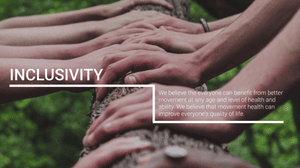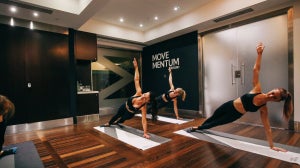
Habit Formation and Behaviour Change
The underlying Movementum message is about empowering a person to move confidently every day and celebrating all its extraordinary benefits and positives. 2 pillars fundamental to this are motivation and confidence.

Building motivation
Why is intrinsic motivation important?
The people who will be most effective at making a behaviour change and maintaining it over time will be those who are intrinsically motivated. Intrinsic motivation is defined as doing an activity because of the joy and satisfaction it gives you. Those who are intrinsically motivated are those that their reasons for the behaviour are tied to their values, goals, or identity in other words, their why. Values are the anchors in our lives. In our Movementum World we use values and goals as launch points to drive behaviour change.
It important to be clear on what your intention is within every type of session you do. Is it that you want to feel like you can move more freely in your body? Is it to perform better at work? Or even just relieve some stress? The more you acknowledge and understand your why the more you can harness it to support yourself.
Health behaviour change is difficult. People who continually reflect on why they want to try to change their habits are more likely to succeed. This can happen at a macro level e.g., through discovering and being reminded of their why. Or even at a micro level e.g. picking hashtags that accompany your name after a movement session. These hashtags let you share something meaningful about yourself and your fitness goal using easily understood shorthand (e.g., #MovementumMums)
Recommendations for practice – the 5 Whys?
5 whys to the root of why:
· It may take 4-5 whys to get to get your true why. For example, if it's important for you to feel fit, why is that important? Because it gives you more energy? Why is that important? Because you feel like they can make a greater contribution in your life when you have more energy. Why is that important? Because being a positive role model is important to you, being a leader in your field, or excelling at a specific aspect of life is important or being able to show up for others helps you come alive.
· So now “feeling fitter” takes on a whole new meaning for you, and next time you feel like scrimping on a workout, or motivation is waning it’s important for you to remember that you are not pursuing getting fitter to get to x number of steps on your fitness tracker alone you’re dedicated to getting fitter because of what it enables them to do in your life, what it gives you back.
Building confidence
Confidence can be defined as feeling capable of successfully meeting the demands of the desired behaviour. It emphasises the need for capability (ability to build confidence and overcome barriers). We all want to feel like we are capable of succeeding and are being matched up to our current ability.
We know through behavioural science that not only does feeling confident support mastery of movements and activities, but it also boosts your self-esteem. If we are in a positive state of mind it taps into the “broaden and build” theory of positive emotions i.e., your emotional state affects how much you can learn and take risks. By enhancing positive emotions, it enhances directionality (i.e., engagement).
Recommendations for practice:
How do we do this?
Be clear in your head what you are going to do before a movement session (tie this in with the benefits to you)
Break your session/movements/goals into their component parts
Visualise your success
Provide yourself with intrinsically motivating feedback and instructions
Give yourself choice but not too much choice
Habits and mental wellbeing
Changing habits and building confidence/motivation is hard work but movement is a fantastic way to initiate this. We know the physical gains through movement is also associated with positive mental wellbeing.

Related Articles


